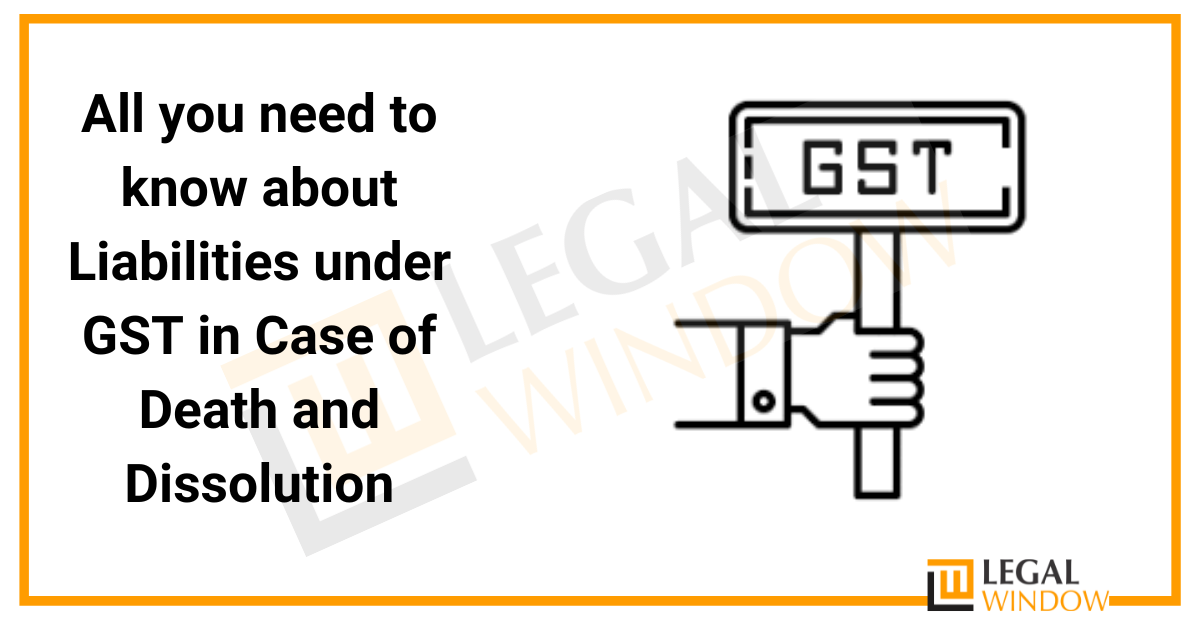All you need to know about Liabilities under GST in Case of Death and Dissolution
- April 15, 2023
- GST

Goods and Services Tax (GST) is a destination-based tax system that replaced various indirect taxes in India. Under the GST regime, every registered person is required to file regular returns and comply with the tax provisions. However, in case of death or dissolution of the registered person, certain liabilities arise under GST, which must be duly discharged. In this article, we will discuss the liabilities under GST in case of death and dissolution.
Brief overview about Liabilities under GST
GST, all businesses with a turnover above certain thresholds are required to register for GST. To obtain a unique GST identification number (GSTIN). They are also required to file regular GST returns, which include details of their business transactions and tax paid on such transactions. GST has significant implications on taxpayers, including businesses and consumers.
For businesses, it has introduced a new tax system that requires proper accounting of all business transactions and tax payments. Liability under GST refers to the legal responsibility of a registered taxpayer to pay the appropriate amount of tax on their taxable supplies and fulfil all the compliance requirements as specified under the GST laws. The liability under GST is determined based on the type of supply, value of supply, place of supply, and tax rate applicable to the supply.
In simple terms, a registered taxpayer is liable to pay GST on their taxable supplies and is responsible for maintaining proper records of all transactions and filing regular GST returns. GST liability can arise from various sources, such as the sale of goods or services, import of goods, or receipt of goods or services on which reverse charge mechanism is applicable.
Death of a Registered Taxpayer and its implications on GST Liabilities
When a registered person dies, his legal heirs are liable to discharge the GST liabilities that arise till the date of death. The legal heirs are required to file the GST returns for the period till the date of death and pay the tax dues. The legal heirs can also apply for cancellation of registration within 30 days from the date of death.
However, if the legal heirs continue the business, they need to obtain a new registration and comply with the GST provisions.
The death of a registered taxpayer can have significant implications on GST liabilities. In case of the death of a registered taxpayer, their legal heirs or representatives are required to file all the pending GST returns and pay any outstanding tax liabilities.
The legal heirs or representatives of the deceased taxpayer are required to apply for cancellation of the GST registration of the deceased taxpayer. They can do so by submitting an application along with a death certificate and other relevant documents to the GST authorities.
If the legal heirs or representatives of the deceased taxpayer do not comply with these requirements, the GST authorities may initiate legal action against them to recover the outstanding tax liabilities. In such cases, the legal heirs or representatives may be liable to pay the outstanding tax liabilities from the assets inherited from the deceased taxpayer.
Dissolution of a Registered Business Entity and its implications on GST Liabilities
When a registered person dissolves his business, he is required to file the final GST return within three months from the date of dissolution. The final return should contain details of all the outward supplies made and inward supplies received during the period from the last return till the date of dissolution. The final return should also contain details of the closing stock held on the date of dissolution.
The registered person is also required to pay the tax dues along with the final return. If there is any excess input tax credit, it can be claimed as a refund. However, if there is any tax liability, it should be paid before filing the final return.
Dissolution of a registered business entity can have significant implications on GST liabilities. Here are some important points to keep in mind:
- File final Return: The registered business entity must file a final return within three months from the date of dissolution. The final return must include details of all the transactions up to the date of dissolution of the business entity.
- Pay outstanding Tax Liabilities: The registered business entity must pay any outstanding tax liabilities up to the date of dissolution. They must ensure that all the tax liabilities are paid within the due date to avoid any penalties or legal action by the GST authorities.
- Surrender GST Registration Certificate: The registered business entity must surrender the GST registration certificate to the GST authorities after the filing of the final return and payment of all the outstanding tax liabilities.
- Apply for cancellation of GST Registration: The registered business entity must apply for the cancellation of the GST registration. They can do so by submitting an application along with relevant documents to the GST authorities.
- Dispose of Inventory and Assets: The registered business entity must dispose of their inventory and assets before the dissolution of the business entity. They must ensure that the disposal of inventory and assets is done in compliance with the GST regulations.
- Transfer of GST Liabilities: In case of transfer of business, the GST liabilities of the dissolved business entity may be transferred to the new business entity as per the GST regulations.
Responsibilities of Legal Heirs or Representatives
The Legal Heirs or Representatives has the following responsibilities:
After the death of a Registered Taxpayer
The legal heirs or representatives of a deceased registered taxpayer have certain responsibilities after the taxpayer’s death to comply with the GST regulations. Here are some of their key responsibilities:
- File pending GST returns: The legal heirs or representatives of the deceased registered taxpayer are required to file all the pending GST returns up to the date of the taxpayer’s death. They must ensure that all the transactions are properly recorded, and the tax liability is calculated and paid accurately.
- Pay outstanding tax liabilities: The legal heirs or representatives of the deceased registered taxpayer are also responsible for paying any outstanding tax liabilities up to the date of the taxpayer’s death. They must ensure that all the tax liabilities are paid within the due date to avoid any penalties or legal action by the GST authorities.
- Apply for cancellation of GST registration: The legal heirs or representatives of the deceased registered taxpayer are required to apply for the cancellation of the GST registration of the taxpayer. They can do so by submitting an application along with a death certificate and other relevant documents to the GST authorities.
- Maintain proper records: The legal heirs or representatives of the deceased registered taxpayer must maintain proper records of all the transactions related to the GST liability, such as invoices, receipts, and payment vouchers. They must also ensure that all the documents related to the GST liability are properly maintained and preserved for future reference.
- Cooperate with GST authorities: The legal heirs or representatives of the deceased registered taxpayer must cooperate with the GST authorities in case of any inquiries or audits related to the GST liability. They must provide all the necessary information and documents as required by the GST authorities.
After the dissolution of a registered business entity
After the dissolution of a registered business entity, the partners or directors of the business entity have certain responsibilities that they must fulfil. Here are some important points to keep in mind:
- File final return: The partners or directors of the dissolved business entity must ensure that a final GST return is filed within three months from the date of dissolution. The final return must include details of all the transactions up to the date of dissolution of the business entity.
- Pay outstanding tax liabilities: The partners or directors of the dissolved business entity must ensure that all the outstanding tax liabilities up to the date of dissolution are paid. They must ensure that all the tax liabilities are paid within the due date to avoid any penalties or legal action by the GST authorities.
- Surrender GST registration certificate: The partners or directors of the dissolved business entity must ensure that the GST registration certificate is surrendered to the GST authorities after the filing of the final return and payment of all the outstanding tax liabilities.
- Dispose of inventory and assets: The partners or directors of the dissolved business entity must ensure that the inventory and assets of the business entity are disposed of before the dissolution of the business entity. They must ensure that the disposal of inventory and assets is done in compliance with the GST regulations.
- Transfer of GST liabilities: In case of transfer of business, the GST liabilities of the dissolved business entity may be transferred to the new business entity as per the GST regulations.
Filing of pending GST Returns and payment of outstanding Tax Liabilities
The legal representative or legal heirs should keep in mind to file the pending GST Return and payment of outstanding Tax Liabilities, let us discuss the cases in detail when the legal heir should file them:
In case of Death
Filing of pending GST returns and payment of outstanding tax liabilities are two crucial aspects that the legal heirs or representatives of a deceased registered taxpayer must take care of to comply with the GST regulations. Here are some important points to keep in mind:
- File pending GST returns: The legal heirs or representatives of the deceased registered taxpayer must file all the pending GST returns up to the date of the taxpayer’s death. They must ensure that all the transactions are properly recorded, and the tax liability is calculated and paid accurately. Failure to file the pending GST returns can attract interest, penalties, and legal action by the GST authorities.
- Pay outstanding tax liabilities: The legal heirs or representatives of the deceased registered taxpayer are responsible for paying any outstanding tax liabilities up to the date of the taxpayer’s death. They must ensure that all the tax liabilities are paid within the due date to avoid any penalties or legal action by the GST authorities. If the legal heirs or representatives fail to pay the outstanding tax liabilities, the GST authorities may initiate legal action against them to recover the dues.
- Use input tax credit (ITC) available: The legal heirs or representatives of the deceased registered taxpayer can utilize the input tax credit (ITC) available in the GST account of the deceased taxpayer to pay the outstanding tax liabilities. They must ensure that the ITC claimed is valid and matches the details of the relevant invoices.
- Seek professional help: The legal heirs or representatives of the deceased registered taxpayer can seek professional assistance from a chartered accountant or a tax consultant to file the pending GST returns and pay the outstanding tax liabilities. This will help them comply with the GST regulations and avoid any penalties or legal action by the GST authorities.
Legal Window can assist you with the filing of GST Returns for any type of provider or company simply by following a few simple procedures, giving the finest support, timely delivery, and ensuring the greatest level of customer satisfaction. You may reach us at 072407-51000 or by email at admin@legalwindow.in.
In case of Dissolution of Business
Filing of final GST returns and payment of outstanding tax liabilities are important aspects to be considered. When a registered business entity is dissolving or its GST registration is cancelled. Here are some important points to keep in mind:
- File final return: A final return must be filed by the registered business entity within three months from the date of dissolution or cancellation of GST registration. The final return must include details of all the transactions up to the date of dissolution or Cancellation of GST Registration.
- Payment of outstanding tax liabilities: The registered business entity must pay all the outstanding tax liabilities up to the date of dissolution or cancellation of GST registration. This includes any tax that is due for any period before the date of dissolution or cancellation. They must ensure that all the tax liabilities are paid within the due date to avoid any penalties or legal action by the GST authorities.
- Claiming input tax credit: The registered business entity can claim input tax credit on goods or services received before the date of cancellation of GST registration. However, the input tax credit cannot be claimed on goods or services received after the date of cancellation.
- Filing of Annual Return: The registered business entity must ensure that the annual return for the financial year in which the business was dissolved or GST registration was cancelled is filed in a timely manner.
- Filing of Return under Section 39: A registered business entity whose GST registration has been cancelled must ensure that any return under Section 39 that is due before the date of cancellation is filed within the due date.
- Payment of late fees: If any returns are filed late or tax liabilities are paid late, then late fees may be levied. The registered business entity must ensure that any late fees are paid along with the outstanding tax liabilities.
Cancelling the GST registration
The legal representative or legal heirs should cancel the GST Registration; let us discuss the cases in detail when the legal heir should cancel it:
In case of deceased taxpayer
Cancelling the GST registration of a deceased taxpayer is a necessary step that the legal heirs or representatives must take to comply with the GST regulations. Here are some important points to keep in mind:
- Apply for cancellation of GST registration: The legal heirs or representatives of the deceased registered taxpayer must apply for the cancellation of the GST registration of the taxpayer. They can do so by submitting an application along with a death certificate and other relevant documents to the GST authorities. The application must be submitted within 30 days from the date of the taxpayer’s death.
- Return the unused input tax credit (ITC): The legal heirs or representatives of the deceased registered taxpayer must return any unused input tax credit (ITC) available in the GST account of the deceased taxpayer. This is because the ITC can only be used by the registered taxpayer and cannot be transferred to the legal heirs or representatives.
- File final return: The legal heirs or representatives of the deceased registered taxpayer must file a final return within three months from the date of cancellation of the GST registration. The final return must include details of all the transactions up to the date of cancellation of the GST registration.
- Pay any outstanding tax liabilities: The legal heirs or representatives of the deceased registered taxpayer must pay any outstanding tax liabilities up to the date of cancellation of the GST registration. They must ensure that all the tax liabilities are paid within the due date to avoid any penalties or legal action by the GST authorities.
- Surrender GST registration certificate: The legal heirs or representatives of the deceased registered taxpayer must surrender the GST registration certificate to the GST authorities after the cancellation of the registration.
In case of Dissolution of business entity
When a business entity is dissolved, the GST registration of the business entity must be cancelled. Here are the steps to cancel the GST registration of a dissolved business entity:
- File final return: The partners or directors of the dissolved business entity must ensure that a final GST return is filed within three months from the date of dissolution. The final return must include details of all the transactions up to the date of dissolution of the business entity.
- Payment of outstanding tax liabilities: The partners or directors of the dissolved business entity must ensure that all the outstanding tax liabilities up to the date of dissolution are paid. They must ensure that all the tax liabilities are paid within the due date to avoid any penalties or legal action by the GST authorities.
- Surrender GST registration certificate: The partners or directors of the dissolved business entity must ensure that the GST registration certificate is surrendered to the GST authorities after the filing of the final return and payment of all the outstanding tax liabilities.
- Submit an application for cancellation of GST registration: After filing the final return and payment of all outstanding tax liabilities, the partners or directors of the dissolved business entity must submit an application for cancellation of GST registration to the GST authorities. The application must be submitted in FORM GST REG-16.
- Verification by GST authorities: The GST authorities will verify the application for cancellation of GST registration and may ask for additional information or documents if required.
- Issue of cancellation order: Once the GST authorities are satisfied with the application for cancellation of GST registration and all the legal requirements have been met, they will issue an order for cancellation of GST registration.
Legal action initiated by GST authorities in case of Non-Compliance
Let’s see the cases in which Legal Action could be initiated by the GST Authorities in case of Non-Compliance:
In case of Death
The GST authorities may initiate legal action against the legal heirs or representatives of a deceased registered taxpayer in case of non-compliance with the GST regulations. Here are some of the actions that the GST authorities may take:
- Penalty: The GST authorities may impose a penalty for non-compliance with the GST regulations. The penalty can range from 10% to 100% of the tax amount due, depending on the severity of the non-compliance.
- Interest: The GST authorities may charge interest on the outstanding tax liability if it is not paid within the due date. The interest rate is usually 18% per annum and is calculated from the due date until the tax liability is paid.
- Prosecution: The GST authorities may initiate prosecution proceedings against the legal heirs or representatives of the deceased registered taxpayer if they are found guilty of any offense under the GST Act. The prosecution can result in imprisonment, fine, or both, depending on the severity of the offense.
- Recovery proceedings: The GST authorities may initiate recovery proceedings to recover the outstanding tax liability from the legal heirs or representatives of the deceased registered taxpayer. The recovery proceedings can include attachment of bank accounts, seizure of assets, and sale of properties to recover the tax liability.
In case of Dissolution of Business
If a registered taxpayer fails to comply with the GST regulations and guidelines. The GST authorities can initiate legal action against them. Here are some of the legal actions that the GST authorities can take in case of non-compliance:
- Demand Notice: If the GST authorities find any discrepancies or non-compliance with the GST regulations, they can issue a demand notice to the registered taxpayer, asking for payment of outstanding tax liabilities.
- Penalty: The GST authorities can impose a penalty on the registered taxpayer for non-compliance with the GST regulations. The penalty can be up to 10% of the tax due or a minimum of Rs. 10,000, whichever is higher.
- Interest: If the registered taxpayer fails to pay the tax dues within the due date, the GST authorities can charge interest on the outstanding amount. The interest rate is 18% per annum, calculated from the due date of payment until the date of actual payment.
- Seizure of goods: The GST authorities can seize the goods and assets of the registered taxpayer in case of non-compliance with the GST regulations. The seized goods and assets can be sold through auction to recover the outstanding tax dues.
- Prosecution: If the registered taxpayer is found to have committed an offense under the GST Act, the GST authorities can initiate prosecution proceedings against them. The offense can be punishable with imprisonment or a fine or both.
- Blacklisting: The GST authorities can blacklist the registered taxpayer for non-compliance with the GST regulations. This can have severe consequences, including the inability to conduct business and the loss of reputation.
Takeaway
In conclusion, it is important to note that the liabilities under GST in case of death and dissolution must be duly discharged. The legal heirs or partners are required to file the final GST return and pay the tax dues within the prescribed time limit. Any delay or non-compliance can lead to penalties and interest. Therefore, it is advisable to seek professional assistance for compliance with the GST provisions in case of death or dissolution.
CA Pulkit Goyal, is a fellow member of the Institute of Chartered Accountants of India (ICAI) having 10 years of experience in the profession of Chartered Accountancy and thorough understanding of the corporate as well as non-corporate entities taxation system. His core area of practice is foreign company taxation which has given him an edge in analytical thinking & executing assignments with a unique perspective. He has worked as a consultant with professionally managed corporates. He has experience of writing in different areas and keep at pace with the latest changes and analyze the different implications of various provisions of the act.
Categories
- Agreement Drafting (23)
- Annual Compliance (11)
- Change in Business (36)
- Company Law (148)
- Compliance (90)
- Digital Banking (3)
- Drug License (3)
- FEMA (17)
- Finance Company (42)
- Foreign Taxation (6)
- FSSAI License/Registration (14)
- GST (120)
- Hallmark Registration (1)
- Income Tax (202)
- Latest News (34)
- Miscellaneous (165)
- NBFC Registration (8)
- NGO (14)
- SEBI Registration (6)
- Section 8 Company (7)
- Start and manage a business (21)
- Startup/ Registration (130)
- Trademark Registration/IPR (40)
Recent Posts
About us
LegalWindow.in is a professional technology driven platform of multidisciplined experts like CA/CS/Lawyers spanning with an aim to provide concrete solution to individuals, start-ups and other business organisation by maximising their growth at an affordable cost.









